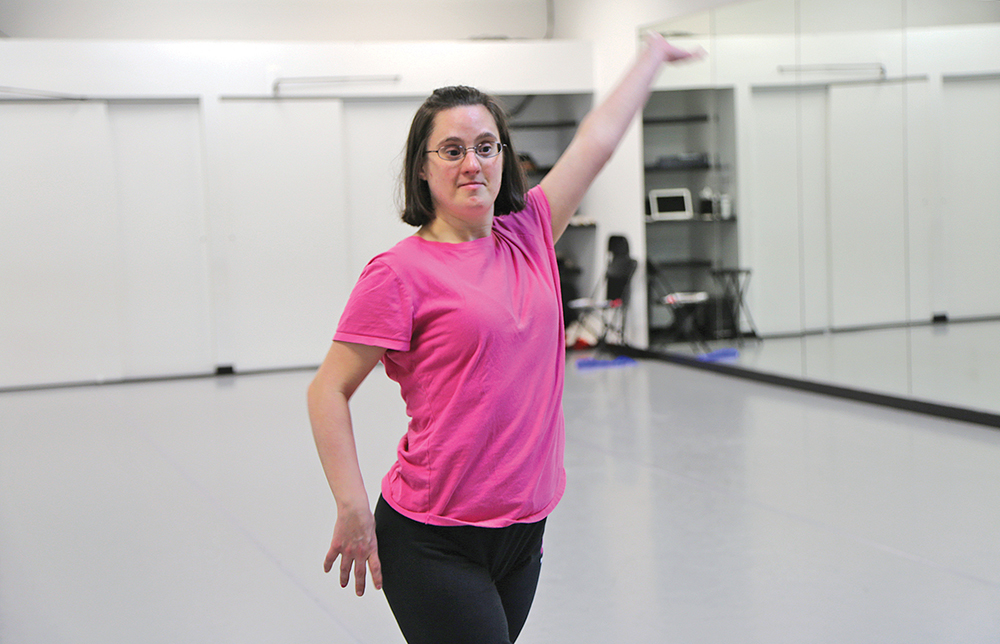Dancers discover their ‘superpower’ through Peconic Ballet Theatre program

Plié … tendu … plié … tendu … sauté. Big finish.
Gabrielle Zeppieri repeats those instructions to her students as they rehearse for an upcoming show. Practice run after practice run, the six women and two men in her class at Peconic Ballet Theatre in Riverhead make their way across the studio floor, one after the other. They hum lightly, melodically, tapping their feet, pointing their toes as the music begins to take form and the sounds grow actionable.
Staring at the reflections that stare back at them, the group members sway their bodies in unison. They are prepping for a unique ballet performance.
Ms. Zeppieri, who has experience as a school psychologist, teaches a variety of classes at the school, including “Dance Express,” a program designed specifically for individuals with varying intellectual and developmental disabilities. The eight adult participants in this season’s program stole center stage at Southampton’s Avram Theatre May 5, during a “Little Mermaid” ballet, adapted from the 1989 Disney film.
Christiana Bitonti, the founder and director of Peconic Ballet Theatre, started Dance Express three years ago after noticing that dance programs were inaccessible and virtually nonexistent for people with varying abilities, compared to those who are completely able-bodied. The program is a product of her master’s degree in counseling, which she earned from NYU.
“The tools that dance provides for people of all abilities give them a kind of superpower,” she said.
Born and raised in East Moriches, Ms. Bitonti is certified in the American Ballet Theatre dance curriculum and in autism movement therapy. To her, expression is a release — something people feel better after doing.

“Having that modality to say what you want to say, but can’t put in words, really provides a lot for a person,” she said. “ ‘Dance Express’ is the expression of the art form, the expression of the body, the expression of what’s inside and what you want to show everybody.”
This season’s performance featured a few repeat PBT dancers, a number of whom performed last fall in Tchaikovsky’s “The Nutcracker.” The 35-minute version of “Little Mermaid” was the culmination of months of hour-long rehearsals in the studio, costume fittings and tireless at-home practice. Together with other PBT students, the Dance Express performers were on stage for about three minutes playing the roles of fish under the sea — comfortably executing their moves before an audience of family members and friends.
“I am ready and I am excited,” 29-year-old Christin Casali of Farmingville said a week before the show.
Ms. Casali has been dancing since she was 8. In addition to playing piano and guitar, dancing, she said, has helped her move along in life, both socially and in terms of staying active. She smiles ear to ear as “Ms. Gabby” applauds her and her classmates, telling them all how proud she is and how wonderfully they are dancing.
“Rule No. 1,” Ms. Zeppieri said during rehearsal, “smile. Rule No. 2: Dance your best. Rule No. 3: Have fun.”
The students clapped, then returned to their positions as Ms. Zeppieri cued the music for another practice run.
“It helps me express my feelings … and it makes me feel proud,” Ms. Casali said of dancing. “It doesn’t matter if I have mild autism or I’m legally blind. I’m a normal person at the end of the day.”
Her mother, Sue Casali, said her daughter feels the music, hears the music and responds through movement.
“She always likes to say she has better hearing than the rest of us because she has lack of vision,” Sue Casali said. “[PBT] is a place where she feels very comfortable dancing around, she feels very special in the outfit, getting all dressed up with makeup and doing her little pliés … it’s a time for her to be a princess.”
Ms. Bitonti said she does not have enough kind words for Ms. Zeppieri, her patience and her talent.
“Her ability to inspire and be with the students, and her vision for how they perform on stage inspires me and I’m sure inspires a lot of people here,” she said.
That sentiment was echoed by Anne Antunovich of East Moriches, whose daughter Christine, 21, is part of the Dance Express group. Ms. Antunovich called Ms. Zeppieri a great asset to Peconic Ballet and said it is critical that programs like Dance Express are made available to adults.
“There’s an awful lot available for those under [18],” she said, “through schools and so forth … but it’s always been a challenge.” Christine Antunovich, who has Down syndrome, called the performance “exhilarating” and said dance helps her overcome her fears.
Kayla Stehling, an East Patchogue native, has been dancing for over 17 years. She suffers from Prader-Willi syndrome, a genetic condition that leads to low muscle tone and causes developmental delays. Ms. Stehling, a songwriter and author, said the performance was “magical,” adding that dance relaxes her.
“This here brings her joy,” said her mother, Pat Stehling. “She feels part of a group, she feels included.” Dancing, Ms. Stehling said, helps her daughter stay active, while building self-esteem.
“I just want to see them enjoy, be themselves, get the applause that is needed for them to feel good,” Ms. Stehling said just minutes before her daughter was set to walk on stage, “because they deserve it as much as anybody else.”


